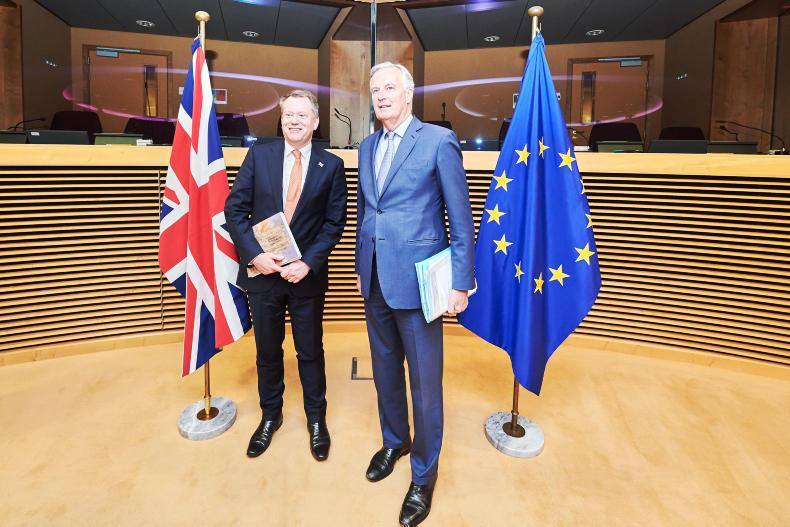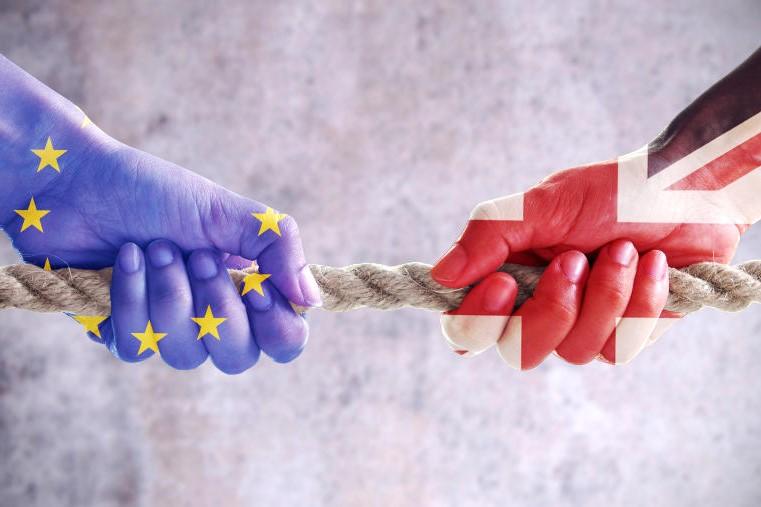As we enter the last week of July, there are less than 160 days left until the UK splits completely with the EU. Unless there is rapid progress on securing an agreement for trade in the next few weeks, the trading relationship will revert to the way it was before the UK and Ireland joined the EU in 1973 - never mind the fact that it is already committed to reverting to the conditions before the single market was established in January 1993.
Pre-single market or pre-EU
As Ireland is a major exporter of agricultural produce to the UK, this would be a disastrous outcome. At this point, with the UK determined not to be bound by single market rules, a split from frictionless trade is unavoidable and the UK recognised this in its recent publication of border controls, to be introduced between January and July 2021. According to the Financial Times, this will be a £7bn annual administrative cost on UK traders. While there isn’t a specific Irish figure, the reality is that there will be customs and health documentation that has to accompany each load, which has to be an administrative cost irrespective of the outcome of these talks.

David Frost (left), UK chief Brexit negotiator and Michel Barnier (right), EU chief Brexit negotiator.
All of this happens even if a deal is agreed between the UK and EU - in the coming weeks, the administrative procedure will happen regardless. The difference between when the UK and Ireland joined the EU in 1973 and the arrival of the single market was that trade between the nine members had no tariffs and no quotas after a period of adjustment. This meant that individual countries couldn’t use tariffs to protect their domestic industry, which helped Ireland develop its export trade to the rest of the EU, as well as the UK.
Minimum agreement not the answer
The minimum ambition of the current EU-UK trade negotiation is to retain this no tariff, no quota arrangement. If that fails, trade will be conducted on the basis of applying tariffs, based on the schedule submitted to the WTO by the UK and EU, which is particularly penal for agricultural produce.
At this point, with the UK determined not to be bound by single market rules, a split from frictionless trade is unavoidable
Even if this ultimate disaster for Irish agricultural exports to the UK is avoided by some sort of a tariff and quota-free deal, the UK making trade deals with Australia and New Zealand is seriously damaging to Irish agricultural exports. The UK government impact assessment reveals that they expect imports from New Zealand to increase by 40% and from Australia by 80%, made up primarily by beef and sheepmeat. That means New Zealand beef and Australian beef and lamb will be as common in the UK as New Zealand lamb is at present, which will squeeze Irish exports.
Ireland one of the biggest losers
Brexit, of course, has implications for UK industry and other EU countries. The EU have allocated a €5bn contingency fund to offset the damage to EU exporters as a result of Brexit, and Irish agri foods are among the most eligible categories.
New Zealand beef and Australian beef and lamb will be as common in the UK as New Zealand lamb is at present, which will squeeze Irish exports
However, any such fund is an interim measure and the long-term trading relationship is such that the UK market will be less valuable for Irish exports. There will be, at best, an extra administration cost in doing business there. The worst case scenario is that there will be tariffs as well and the choice now appears to be no deal and a cliff-edge crash, or a basic free trade deal that will still seriously damage Irish exports.
As we enter the last week of July, there are less than 160 days left until the UK splits completely with the EU. Unless there is rapid progress on securing an agreement for trade in the next few weeks, the trading relationship will revert to the way it was before the UK and Ireland joined the EU in 1973 - never mind the fact that it is already committed to reverting to the conditions before the single market was established in January 1993.
Pre-single market or pre-EU
As Ireland is a major exporter of agricultural produce to the UK, this would be a disastrous outcome. At this point, with the UK determined not to be bound by single market rules, a split from frictionless trade is unavoidable and the UK recognised this in its recent publication of border controls, to be introduced between January and July 2021. According to the Financial Times, this will be a £7bn annual administrative cost on UK traders. While there isn’t a specific Irish figure, the reality is that there will be customs and health documentation that has to accompany each load, which has to be an administrative cost irrespective of the outcome of these talks.

David Frost (left), UK chief Brexit negotiator and Michel Barnier (right), EU chief Brexit negotiator.
All of this happens even if a deal is agreed between the UK and EU - in the coming weeks, the administrative procedure will happen regardless. The difference between when the UK and Ireland joined the EU in 1973 and the arrival of the single market was that trade between the nine members had no tariffs and no quotas after a period of adjustment. This meant that individual countries couldn’t use tariffs to protect their domestic industry, which helped Ireland develop its export trade to the rest of the EU, as well as the UK.
Minimum agreement not the answer
The minimum ambition of the current EU-UK trade negotiation is to retain this no tariff, no quota arrangement. If that fails, trade will be conducted on the basis of applying tariffs, based on the schedule submitted to the WTO by the UK and EU, which is particularly penal for agricultural produce.
At this point, with the UK determined not to be bound by single market rules, a split from frictionless trade is unavoidable
Even if this ultimate disaster for Irish agricultural exports to the UK is avoided by some sort of a tariff and quota-free deal, the UK making trade deals with Australia and New Zealand is seriously damaging to Irish agricultural exports. The UK government impact assessment reveals that they expect imports from New Zealand to increase by 40% and from Australia by 80%, made up primarily by beef and sheepmeat. That means New Zealand beef and Australian beef and lamb will be as common in the UK as New Zealand lamb is at present, which will squeeze Irish exports.
Ireland one of the biggest losers
Brexit, of course, has implications for UK industry and other EU countries. The EU have allocated a €5bn contingency fund to offset the damage to EU exporters as a result of Brexit, and Irish agri foods are among the most eligible categories.
New Zealand beef and Australian beef and lamb will be as common in the UK as New Zealand lamb is at present, which will squeeze Irish exports
However, any such fund is an interim measure and the long-term trading relationship is such that the UK market will be less valuable for Irish exports. There will be, at best, an extra administration cost in doing business there. The worst case scenario is that there will be tariffs as well and the choice now appears to be no deal and a cliff-edge crash, or a basic free trade deal that will still seriously damage Irish exports.







 This is a subscriber-only article
This is a subscriber-only article










SHARING OPTIONS: